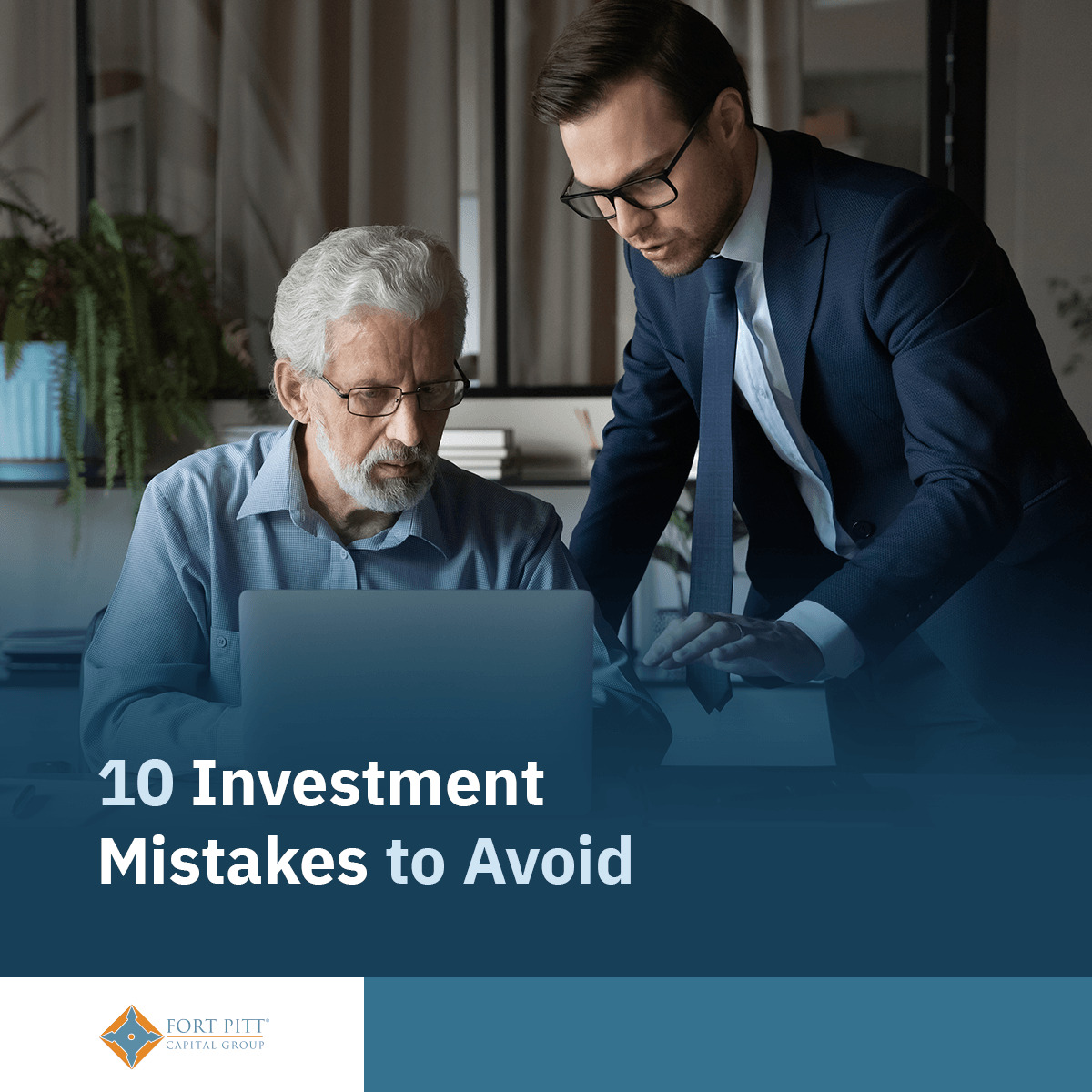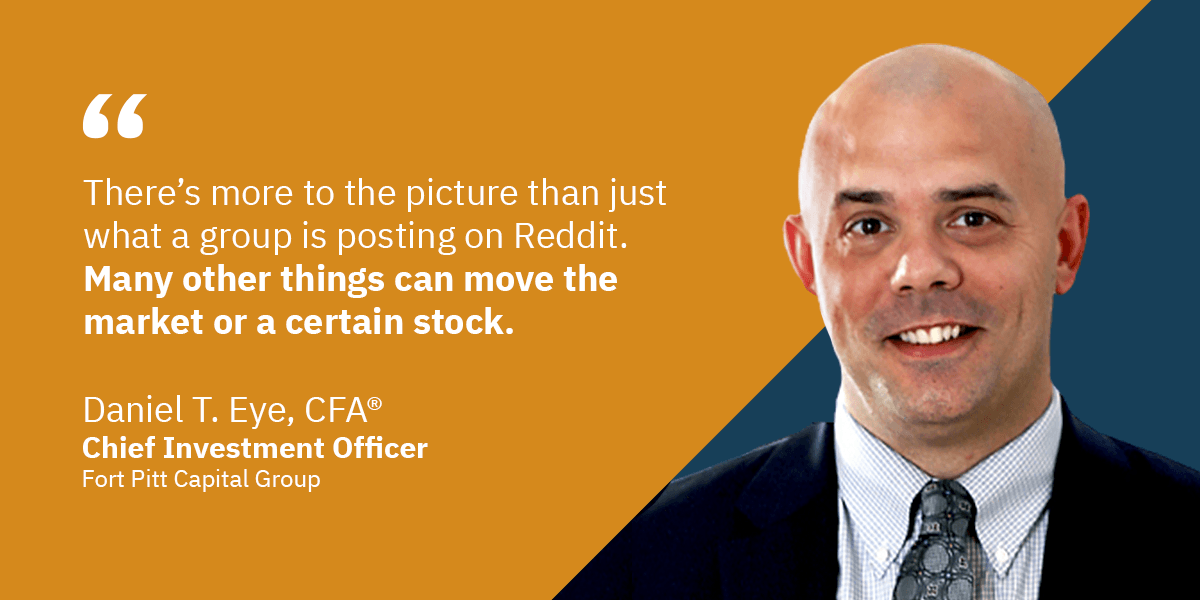10 Investment Mistakes to Avoid

If you want to have enough to live on in retirement, you need to invest. But many people are unsure how to start investing, nervous about losing their money, or wonder what not to do in the stock market.
While there are always ups and downs in the market, investing is the best way to beat inflation and watch your nest egg grow. The average annual return for the market is over 10% according to Investopedia.com. But whether they are newbies or have been at it for years, people make common mistakes when investing. Here are some things you can do to try to maximize your investments and avoid missing out on a sizable nest egg.
1. Going to Cash
People say cash is king, but it isn’t in terms of long-term growth. Going to cash can seem like a safe option when the market is volatile. Since savings accounts are FDIC-insured, there’s very little chance the amount in the account will shrink. However, there’s a clear difference between ‘going to all cash’ and ‘raising cash’ when managing risk. When we receive instructions to ‘go completely to cash’ in a client’s portfolios, it’s typically triggered by an emotional reaction that can negatively impact portfolio outcomes. While it may seem logical to ‘go to all cash’ to avoid ‘crashes,’ the risk of mistiming the markets can potentially result in even more downside. However, it’s important to keep in mind that managing risk is not the same as avoiding risk and investing without the acceptance of risk is unavoidable. Just be sure to take actions to minimize the impact of the risk if things don’t work out as planned.
2. Recency Bias
Recency bias occurs when investors focus too much on contemporary events rather than historical patterns or things that might be more relevant to their situation. For example, after learning about a plane crash, people might hesitate to book a flight, even though statistics show only a slight chance of their flight crashing. Likewise, though shark attacks are rare, you might skip a beach vacation after watching a movie about sharks.
Thanks to recency bias, investors might believe that a market downturn will continue indefinitely, even if evidence suggests otherwise. Recency bias can also push people to buy “hot” stocks or invest in stocks that might not be the best for the long term.
One way to fight recency bias is to look at the big picture. The market typically bounces back after a downturn. In our experience, the best market days can come immediately after a sudden dip. Looking at the big picture can help you avoid acting emotionally, allowing you to build up your nest egg.
3. Confirmation Bias
A confirmation bias is when you look for evidence that supports your belief but avoid any contrary evidence. For example, children with faith in Santa Claus will search for proof to reinforce that belief, such as presents that appear under the tree on Christmas morning or cookies that someone has eaten.
Confirmation bias can be an investing mistake when it encourages people to cling to or avoid investments because of what they think they know. You might purchase too much of a particular asset due to confirmation bias because you only look at the good news and ignore warning signs.
Even successful investors can miss out on excellent opportunities due to confirmation bias. For example, suppose you got burned by purchasing stocks of a newly public company in the past. You might decide to avoid investing in companies that have recently gone public in the future. You could miss out on some gems by setting that rule for yourself.
4. Trying to Time the Market
“Buy low and sell high” is the gold standard of investing advice. However, some investors take that advice a little too literally, leading to stress and an overemphasis on trying to time the market. When investing, we believe that slow and steady progress will prepare you for retirement, rather than trying to buy the perfect stocks at the right moment. In addition, you’re more likely to see sustainable results if you take a long-term approach to investing. Invest over the years, focusing on long-term growth rather than sudden wealth.
During the pandemic, day trading became an increasingly popular hobby. However, many people have difficulty figuring out when to get out of hot stock. Many who try to time the market lack the knowledge of a company’s fundamentals, such as its business model and growth trajectory. “They’re just following a trend,” said Dan Eye, CFA, head of asset allocation and equity research at Fort Pitt Capital Group. “There’s more to the picture than just what a group is posting on Reddit. Many other things can move the market or a certain stock.”
5. Paying Excessive Fees
The majority of investors can’t enter the market without paying a fee to some type of financial intermediary. One common mistake made by investors is shrugging off what seem to be low fees, thinking that they won’t significantly impact their returns. However, what looks like a small amount can add up over time.
If you save $500 per month over 30 years and pay a 0.25% fee, you’ll pay more than $26,000 in fees over the life of your investment. On the other hand, if you invest the same amount but pay 2% in fees, you’ll cough up more than $178,000, putting a significant dent in your nest egg.
Review the fees carefully before you decide to invest. What a firm charges can vary considerably, but many charge some or all the following:
- Commission fees
- Transaction fees
- Expense ratio fees
- Sales load fees
- Administration fee
- Management fees
When possible, look for low-fee or no-charge investments.
6. Taking on Too Much Risk as You Near Retirement
Some investments are riskier than others. Often, riskier investments produce a better return. For example, stocks are more volatile than bonds but have a higher average return rate over time.
If you’re approaching retirement age and haven’t invested enough, investing in high-risk but potentially high-return investments can be tempting to make up for lost time. But as Cory Phillips, one of Fort Pitt Capital Group’s financial advisors, pointed out, “You literally can’t save yourself into prosperity in [a short amount] of time.”
Around five years before your ideal retirement date, move the majority of your retirement fund into low-risk investments. If you are not where you want to be financially at that time, talk with a financial advisor to see what the best approach would be in your situation. There are ways to grow your wealth even in retirement, read our cheat sheet to learn more.
7. Being Too Conservative When You’re Young
Thanks to compound interest and time, if you start investing when you’re young, you have more time to build up a decent nest egg. When the market is volatile during their youth, many young investors might want to try and play it safe and invest in more conservative, lower-risk assets, such as bonds.
Often, lower-risk assets also have a lower rate of return. You might not lose much from your investment, but you also aren’t likely to gain much. Because you have a longer period before you retire, you have more room to take risks when you’re young, such as buying stocks and potentially reaping a higher annual return.
If you’re concerned about choosing the right assets to invest in, a solid option is to find a financial advisor. Your advisor can recommend investments based on your retirement goals and risk tolerance. Read our blog post on when you should hire (or change) your financial advisor.
8. Not Automating Your Investment Contributions
Make it easy to invest in your future by putting your contributions on autopilot. Have your desired contribution amount automatically pulled from your paycheck and invested in your account whenever you get paid. If you have a 401(k) through your employer, you can set up automatic contributions that are taken out pre-tax.
Automating contributions can benefit you in multiple ways. For instance, if someone gave you a choice between spending $500 right now or saving that same amount for the future, most people would probably decide to splurge. However, if the money you’re investing goes directly into a retirement savings account, you won’t feel tempted to spend it immediately.
Making your contributions automatic also ensures that you’re saving for the future, whether retirement is decades or just a few years away. You don’t have to think about what you’re saving since it’s already taken care of.
You can set up automatic contributions in a few ways. If you have a workplace retirement plan, doing so can be as straightforward as contacting HR. If you want to invest outside a workplace plan, set up an automatic direct debit from your checking account for the days you get paid.
9. Panic Selling
Panic selling typically goes hand in hand with trying to time the market and chasing the hottest stocks. When people panic, they may sell off their shares of a particular stock all at once. The massive sell-off may push the stock price down, which can often trigger additional sales, further suppressing the price.
Panic selling is usually a desperate attempt by investors to stave off future losses. However, it’s a Catch-22 because panic selling pushes the stock’s price even lower. By trying to avoid a massive loss, investors create the problem they feared.
During a market panic, keep calm. Stop reading the news, and don’t constantly check your portfolios. If you’re feeling particularly nervous, you might want to contact your financial advisor to see what they think about the situation.
When it comes to long-term investing, holding your stocks, especially when there’s a lot of volatility in the market, is often the right move.
10. Not Meeting With a Financial Advisor
“Hold your advisors to the highest standard on everything from insurance to retirement. It is too vital to be complacent.
A financial advisor, particularly one who acts as a fiduciary, has a legal and moral obligation to recommend an investment approach in your best interest. Therefore, your financial advisor will account for your financial goals and targets when suggesting an investment plan. Additionally, an experienced professional can help you resist the urge to panic or make hasty moves in the market based on trends or “hot stocks.”
Not working with an advisor can seem like a way to save money, as you can avoid paying management fees. But in the long run, we believe the advice you get from a trusted fiduciary advisor is worth the price you pay.
Working with a financial advisor is about more than just investment planning. Here at Fort Pitt Capital, we can advise you on ten core areas that impact your financial health.
What Should You Consider When Choosing a Financial Services Company?
Not all financial services companies and advisors are equal. When choosing a company to work with, look for the following qualities.
- Fiduciary: A fiduciary must act in their clients’ best interests. Any investment advice you receive from a fiduciary advisor will depend on careful consideration of your goals and needs. You can rest assured that a fiduciary suggests a particular asset to you because they’ve done the work and believe it will help you financially.
- Fee structure: Look for a financial services company that uses a fee-based structure rather than a commission-based one. Fiduciaries must charge a fee for their services, as earning a commission on any stocks you buy is a conflict of interest.
- Transparency: Your financial advisor should be transparent in their dealings and willing to explain any concepts that you find confusing or murky.
- Registered investment advisor: Search for an advisor registered with the Securities and Exchange Commission for your peace of mind.
Talk With an Advisor From Fort Pitt Capital Today
If you want to get on track for retirement or need guidance on making your money and investments work for you, the advisors at Fort Pitt Capital Group can help. Contact us today to set up a free consultation to go over your financial goals and see how we can help.






